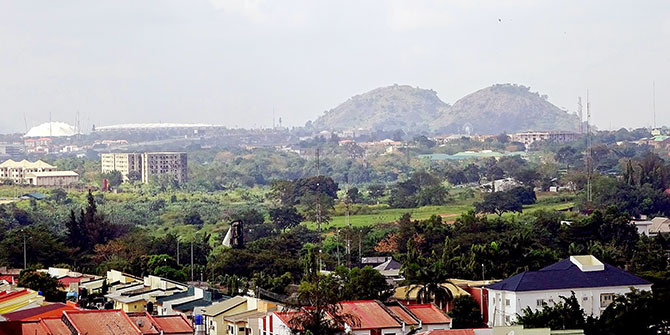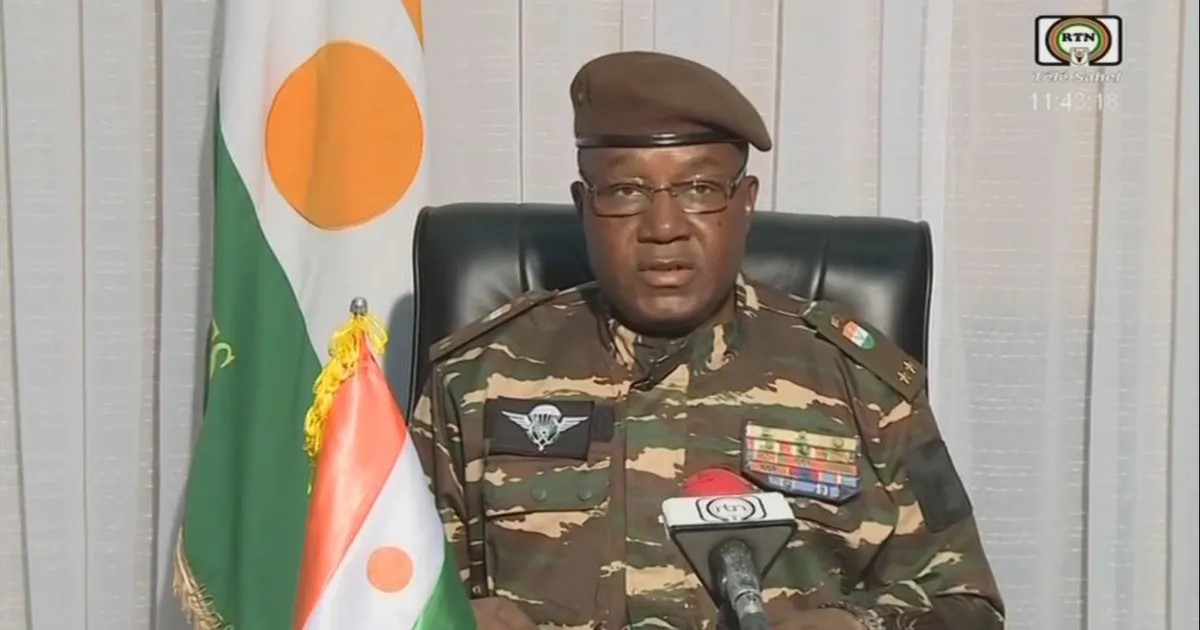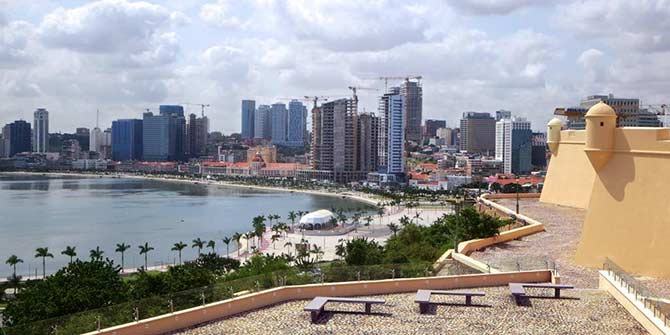Cropping out Vanessa Nakate from a photo with fellow young climate activists at the World Economic Forum has prompted allegations of racism. Despite forecasts that the African continent will be most affected by climate change, the erasure has been seen as part of a broader pattern of silencing African voices on climate debates.
Five young climate activists met at the World Economic Forum in Davos on 24 January 2020, gathered to raise the alarm at global inaction on climate change. The news agency Associated Press (AP) photographed the group, later cropping out the Ugandan climate activist Vanessa Nakate for publication, leaving the four young European climate activists including the famed Greta Thunberg. That the four remaining activists were white prompted allegations of racism, which led to AP arguing the edit was made on ‘purely composition grounds’. But does this fit into a broader pattern of silencing African voices on climate debates? Four graduates from LSE’s Programme for African Leadership give their view.
A presence misconstrued as aesthetically unappealing and unwelcome
Victoria Malowa
To understand the erasure of Vanessa Nakate, we must first consider how mainstream media platforms are choreographed stages, designed to produce or cement ideas or fantasies. In most cases, not everyone gets to participate. We observe this stage production through the experience of Vanessa.
The original photo was choreographed to produce an ideal photo. The Associated Press removed the building structure and skyline in the background, clustering the faces of the white activists and finally chopping off Vanessa from the frame. The resulting photo clearly made Greta stand out. The effect was to set a stage portraying two versions of climate change activism: one represented by Greta Thunberg and her fellow white activists, and the other represented by Vanessa Nakate.
At first, when Nakate confronted the AP about the cropped photo, the media house explained its actions by claiming that it had no ill intentions but did so to enhance the photo’s aesthetic value. But one wonders why this was done at the expense of Vanessa alone and not the other three white activists who were also standing close to Greta.
These aesthetic considerations may appear innocuous to the less discerning, but they hide a much more sinister problem – the idealised version of climate change activism and environmentalism. There may be a growing fascination with the new breed of young activists, but certain powerful institutions like the mainstream media are actively designing the cognitive path through which such activism should be perceived. Vanessa was caught up in an act purposefully intended to bequeath Greta the limelight. When these artistic decisions were being made, Vanessa failed to make the cut. Her presence was not only misconstrued as aesthetically unappealing but also unwelcome.
Even though the effects of climate change on communities of colour are well documented, racial prejudice means such effects are often viewed as inconsequential. Issues of climate change are hence not considered worthy of those communities or of their protection.
Black or white: unity for climate justice
Arthur Owor
The decision to edit out Nakate should be seen against the backdrop of a long history of undercoverage of African voices by Western media in climate justice debates. While the #rhodesmustfall and #feesmust fall movements have reawakened discussions on decolonisation, to bring in voices from the periphery, African collaborators often only appear in the footnotes of published studies in academic journals, and even less often in mainstream coverage on these issues.
I recently attended a workshop on the practice of transnational collaboration in academic research where the dissemination of knowledge through media and academia was still viewed as taking on extractive forms. There remains a sharp divide between the global North and global South in the knowledge production and dissemination process.
Vanessa Nakate’s exclusion from the photo with her fellow activists depicts how deeply the notion of colonialism still permeates the social, economic, political and, more recently, ecological dimensions of society. Writing in 2019, researcher David Mwambari noted that undoing the effects of colonialism has never been easy and cautions that the journey towards decolonisation remains long and treacherous in the age of information and knowledge. Indeed, the move by Associated Press demonstrates that colonialism continues to be a lived reality and is far from over.
The incident epitomises the context in which global climate justice is itself colonised. Africa is often under/misrepresented even though it has lower emissions than other continents – and will be the most affected by climate change. For this reason major campaigns against these injustices are being undertaken by activists and advocacy groups on the continent.
The exclusion of Nakate is an extension of colonialism in international media. But just as Michael Jackson sang twenty-nine years ago, ‘It don’t matter if you’re black or white … it’s a turf war on a global scale, I’d rather hear both sides of the tale…’ Black lives matter. Black faces and voices do too.
Vanessa Nakate is the missing link between climate activism and ‘crops’
Emmanuel Merissa and Susan Lado
While we are used to hearing much about the nexus between climate change and produce, the past week has been abuzz with climate activism and a different kind of ‘crop’.
Africa, despite its low carbon emissions, bears the brunt of climate change-induced catastrophes. The industrialised economies in the global North are culprits unwilling to pull their weight to preserve our planet. Vanessa Nakate’s presence at the World Economic Forum therefore represented not just African people but all those whose perspectives are different from cosseted people’s comfortable realities in cities like Toronto, Stockholm or Rome. Removing her from the photo taken with white counterparts does not only seek to reduce her efforts to naught, but it fundamentally attempts to deny people of colour any say in the debate pitting climate-change sceptics against science-believing folks – highly reflective of the White Saviour Industrial Complex.
There is no doubt that the picture of these anti-climate change campaigners was seen through a racial lens by the AP. After having her presence effaced, Nakate said that she understood what racism meant. Whether in the corporate world, academia, international organisations or non-governmental organisations, worth is still often attributed not to performance but skin colour. In addition to emotional hurt, racism has a negative impact on its victims’ life chances.
Those whose epidermis contains little melanin may be unable to comprehend the way in which whiteness has been historically portrayed as the passport to success, the metric of sophistication or the standard of beauty. The Vanessa Nakate saga is further evidence that there will always be atrabilious minds seeking to remind people of colour that their success does not really count because they simply do not have the ‘right’ appearance.
Unfortunately, racism is not something that will be inevitably cured with better education or exposure. At its root, arrogance and entitlement are responsible for the lack of sympathy between different societies. Although brave individuals like Nakate strive to raise awareness about the alarming level of abnormal weather patterns, certain morally bankrupt entities will prefer to dwell on their skin complexions rather than help them get their message across.
Divisiveness when we should be working together?
Helen Fortunate Mayelle
In the fight against climate change, the issue of bias in reportage of Africa did not begin with the young African climate activist Vanessa Nakate being cropped out of a photo with her fellow activists. As Nakate pins to her twitter page, massive fires in the Congo forest and elsewhere on the African continent have gone unreported by international media, as they raised our attention to fires in the Amazon, Australia and California.
That said, our collective efforts are required to combat climate change. If there is a time in human history when we must all work together, then that time is now. Due to our old tendencies of divisiveness, it is the young generation of the Greta’s and the Nakate’s who are teaching us how to be better humans for people and for planet.
Even if Nakate is cropped out of all her international advocacy event photos, her work will forever be imprinted in the hearts of those who matter; her name will be written in our global history books, albeit in invisible ink. Mother Earth is proud of Nakate and her colleagues, and while these children are not committing to their cause for publicity itself, at the very least we can allow them to participate without erasure or corruption. Together We Can. As an old wise African saying goes, ‘If you want to go quickly go alone, if you want to go far go together.’






Great insights. The authors are right the cropping her out is the normal of global north dominance agenda. While Africa has the least environmental footprint and we have had environmental sustainability activists for decades, the media and UN SDG agenda portray the global south as followers. We should be telling and showing the global north what to do. It’s not about energy transitions, it’s about western destructive business and development models. It’s about under pricing our resources, it’s about having development agencies HQd in the global north running the development agenda in the global south,. It’s about enforcing western governance and political systems on the global south. It’s about economic models telling us we can live on less than $5 a day. It’s about tax evasion & tax avoidance by TNCs. It’s about allowing tax havens to exist. It’s about having a UN Security Council that vetoes everything and claim global inequality is a problem. It’s about WTO that pushes the global north agenda in an unequal playing field. It’s about allowing financial innovations that are fraud and bailing them out. It’s about appointing a British financial regulator to run a UN institution. It’s about wealthy people telling the world what is wrong with it and how to fix it through WEF and others. It’s about leaving the people of the global south out in leading and think Greta knows better than us. Africans have no business being part of these institutions and programmes until we are accorded true equal respect and sit at the table as equals and give direction. The global south has more capability than the politicians these systems insist on engaging at our expense. Until editing us out of all spheres stops, there shall be no meaningful change. Until, we refuse to be treated as insignificant there shall be no progress. Enough of this perpetual colonial approaches and narratives